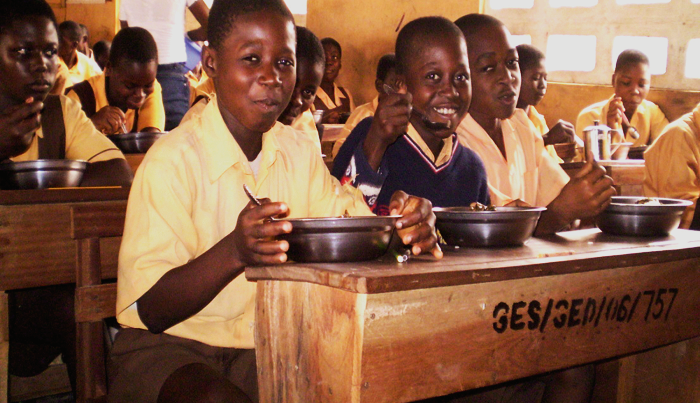
Govt launches School Feeding Policy today
“Our enrolment continues to increase because of the school feeding programme. Before the programme was introduced in our school most of the pupils did not attend school, especially on market days, because they were always selling to supplement their parents’ income or helping them on their farms”.
Advertisement
This is a testimony from a teacher at the Nduaso DA Primary school, in the Assin North District in the Central Region, one of the schools enrolled into Ghana School Feeding Programme (GSFP).
The programme began in 2005 with 10 pilot schools, each drawn from a region of the country. By August 2006, it had been expanded to 200 schools covering 69,000 pupils in 138 districts. At the end of December 2006, the programme was in 598 schools with a total population of 234,800. As of March 2007, a total of 975 schools had been reached by the programme, benefiting 408,989 pupils daily.
Today, the programme benefits 1.7 million primary schoolchildren from all districts across the country.
Background
The GSFP, an initiative under the comprehensive Africa Agricultural Development Pillar three, seeks to enhance food security and reduce hunger. With support from the Dutch government the objective of the programme is to increase school enrolment, attendance and retention, reduce hunger and malnutrition and boost domestic food production in the country.
Like other national social protection programmes, the GSFP provides an opportunity to pursue the country’s commitment to the Sustainable Development Goals (SDGs) as the Goal One seeks to end poverty in all its forms everywhere and Goal Two aims at ending hunger, achieving food security and improved nutrition and also promotes sustainable agriculture.
Goal Four of the SDG seeks to ensure inclusive and equitable quality education opportunities as it seeks to enhance access of girls and boys to quality early childhood development and ensure their access to safe, nutritious and sufficient food all year round.
District operations manual
In the first few years of the operationalisation of the programme, one of the major challenges was the lack of information for key stakeholders regarding their roles and responsibilities and how they related to each other.
Many key stakeholders, including district assemblies, education officers and communities, were not involved in decision-making, hence their apathy towards the implementation of the programme.
To this end a district operational manual was drafted with a purpose to increase the impact of the GSFP through awareness creation and stakeholders’ participation with the aim of sensitising stakeholders to the roles and responsibilities of key implementing actors in GSFP and also to educate district assemblies, District Implementation Committees (DICs), School Implementation Committees (SIC) and caterers/matrons to their roles and responsibilities in the programme.
GSFP Policy
Today, July 20, 2016, the government of Ghana, through the GSFP secretariat under the Ministry of Gender, Children and Social Protection, will be launching the School Feeding Policy.
The goal of the policy is to deliver a well-organised, decentralised intervention providing disadvantaged schoolchildren with nutritionally adequate, locally produced food, thereby reducing poverty through improved household incomes and effective local economic development.
The policy envisions rapid national socio-economic development achieved through a co-ordinated, integrated and accountable national school feeding programme.
Among the objectives of the policy are those to provide sustainable social development support to children in deprived communities; strengthen collaboration and coordination between national and sub-national actors; foster local economic development in food production, marketing and processing; and promote local collaboration and joint ownership of child nutrition, health promotion and education by local authorities, communities and stakeholders.
The policy provides cross-cutting interventions related to gender-sensitivity and social inclusiveness, social accountability, environmental management and sustainability and image building and information management for school feeding.
The policy document will be used side-by-side the National Social Protection Policy launched in June 2016, as it works at addressing some of the challenges that the GSFP.
The policy looks at sustainable financing of school feeding; securing and sustaining the transformation and relevance of school feeding; effective coordination and management; monitoring, evaluation and information-sharing; strengthening farmers’ involvement in school feeding; streamlining service delivery through the caterer-contractor system; and strengthening local ownership of the school feeding programme.
It also takes into consideration issues such as gender-sensitivity and socially inclusive considerations throughout the programme, social accountability, environmental management and sustainability and image building and information management for school feeding in Ghana




